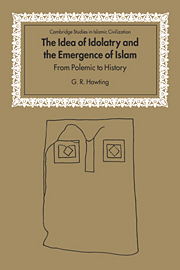Book contents
- Frontmatter
- Contents
- Preface
- Note on transliteration and dates
- List of abbreviations
- Introduction
- 1 Religion in the jāhiliyya: theories and evidence
- 2 Idols and idolatry in the Koran
- 3 Shirk and idolatry in monotheist polemic
- 4 The tradition
- 5 Names, tribes and places
- 6 The daughters of God
- Conclusion
- Bibliography
- Index
Introduction
Published online by Cambridge University Press: 05 July 2009
- Frontmatter
- Contents
- Preface
- Note on transliteration and dates
- List of abbreviations
- Introduction
- 1 Religion in the jāhiliyya: theories and evidence
- 2 Idols and idolatry in the Koran
- 3 Shirk and idolatry in monotheist polemic
- 4 The tradition
- 5 Names, tribes and places
- 6 The daughters of God
- Conclusion
- Bibliography
- Index
Summary
In broad terms this work is concerned with the religious setting within which Islam emerged. More specifically, it asks what it means if we describe the primary message of the Koran as an attack upon polytheism and idolatry. It questions the commonly accepted view that the opponents attacked in the Koran as idolaters and polytheists (and frequently designated there by a variety of words and phrases connected with the Arabic word shirk) were idolaters and polytheists in a literal sense. This introduction, directed primarily at non-specialists, aims to elucidate these issues and to indicate some of the starting-points of the discussion. A reconsideration of the nature and target of the koranic polemic, together with a discussion of why and how it has been commonly accepted that it was directed at Arabs who worshipped idols and believed in a plurality of gods, will have some consequences for the way we envisage the origins of Islam.
Muslim tradition tells us that, insofar as it is a historically distinct form of monotheism, Islam arose in central western Arabia (the Ḥijāz) at the beginning of the seventh century AD as a result of a series of revelations sent by God to His Prophet, Muḥammad. The immediate background, the setting in which Muḥammad lived and proclaimed his message, is known generally in tradition as the jāhiliyya.
- Type
- Chapter
- Information
- The Idea of Idolatry and the Emergence of IslamFrom Polemic to History, pp. 1 - 19Publisher: Cambridge University PressPrint publication year: 1999



